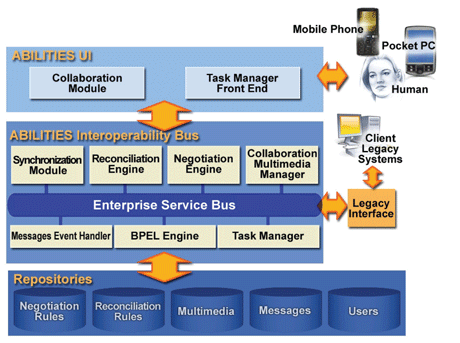by Balázs Pataki and László Kovács
While SMEs (small, medium and micro enterprises) are the largest group of businesses in Europe, their requirements for doing business with each other in an interoperable and cost-effective way have not been in focus until the last couple of years. The European Commission has sponsored the IST project ABILITIES (Application Bus for InteroperabiLITy In Enlarged Europe SMEs) to build a comprehensive solution for SMEs in an enlarged Europe. This will be achieved by studying, designing and implementing a B2B enterprise interoperability solution; such a solution would involve a federated architecture based on adaptive and intelligent UBL active messages to support complete Order-to-Invoice processes of SMEs.
The aim of the ABILITIES project is to implement the ABILITIES Interoperability Bus (AIB) based on an Enterprise Service Bus (ESB) solution. This will help SMEs of new European member states and candidate countries in specific industries to do business with each other in a more straightforward way. Five such industries and numerous SMEs active in those industries have been selected as testbeds for ABILITIES by the head of an umbrella organization (eg incubators and industry associations) in each country. The industries and countries involved are the retail industry in Lithuania, the high-tech industry in Slovakia, the agro-food industry in Turkey, the wood industry in Romania and the tourism industry in Hungary. The research partners involved in the project are TXT e-Solutions, Department of Distributed Systems of SZTAKI, FhG-IPA, Frankfurt am Main University, Kaunas University of Technology, Kosice Technical University and the Middle East Technical University Ankara.
Problems Related to Business Processes
IT solutions address different needs and present different opportunities to SMEs than to large enterprises. This is particularly the case for businesses in new and emerging member states, which in many cases do not even have a (suitable) IT infrastructure, and whose business communication and process execution are based on phone, fax and mail. A survey conducted by ABILITIES has shown, for example, that in Lithuania a typical SME with its current business infrastructure initiates 1000 phone calls per month, 100 of which result in some misunderstanding between partners. Among other things, this survey also revealed that in an average SME, two errors occur when filling in a form, the probability that a business document will be lost is 20%, and the probability that a given document can be found within two minutes is 25%.
The Federated Solution
The solution proposed by ABILITIES deals with these process- and communications-related problems by implementing a customized Enterprise Service Bus (ESB) based on Universal Business Language (UBL). This can be deployed and provided by a third-party service provider - for example, by the umbrella organization of a specific industry - and is based on a federated architecture that seems more suitable for SMEs than traditional unified and integrated business solutions.
Traditional integrated models require each business partner to use the same data formats and protocols; in contrast, unified models define a common metamodel and all partners convert their own data formats and protocols to the metamodel in order to achieve mutual understanding. The federated interoperability approach, on the other hand, does not require business partners to completely conform to a specific or metamodel. When ambiguities or discrepancies emerge for example, due to different interpretations of a business document the possibility exists to resolve the conflict with some other means that may be out of the scope of the current business process.

Conflict resolution can be either automatic or may require human intervention. To provide interoperability at the level of document formats, ABILITIES provides an ontology-based automatic approach driven by a set of reconciliation rules. This approach allows specialized versions of common business documents to be created, which while being customized for a specific market or even a specific company in that market, can still be exchanged among business partners by having a commonly agreed ontology of business terms.
Reaching a common understanding at the level of document content however, requires a different approach that is not strictly metamodel-based and uses various forms of on-the-fly mediation involving programmed or human intelligence. For this, ABILITIES selected the federated model approach and the use of groupware and multimedia extensions, combined with existing interoperability solutions. The system initially tries to deal with the business flow between two partners using a preprogrammed logic (a workflow in a business process engine). When a condition or situation is met that cannot be automatically resolved (no handler is available for the exceptional case in the workflow), or if common understanding between the two partners cannot be reached (ie a misunderstanding or misinterpretation of business document content occurs), ABILITIES provides alternative ways for the conflict to be handled. These take the form of support for collaborative tools (negotiation, notification, groupware tool support) and multimedia enhancement of business documents (non-textual information to support the common understanding of document content).
Evaluation of ABILITIES
The ABILITIES system is expected to be deployed in testbeds in the fall of 2007. In its final form it will provide three interfaces for SMEs: a Web portal, a GUI optimized for mobile phones, and a legacy system interface based on Web services. The testbeds will evaluate the AIB under actual business conditions and will provide performance indicators to measure its effect on the way SMEs function.
Links:
Department of Distributed Systems of SZTAKI: http://dsd.sztaki.hu
Please contact:
László Kovács
SZTAKI, Hungary
Tel: +36 1 279 6212
E-mail: laszlo.kovacs![]() sztaki.hu
sztaki.hu









